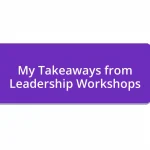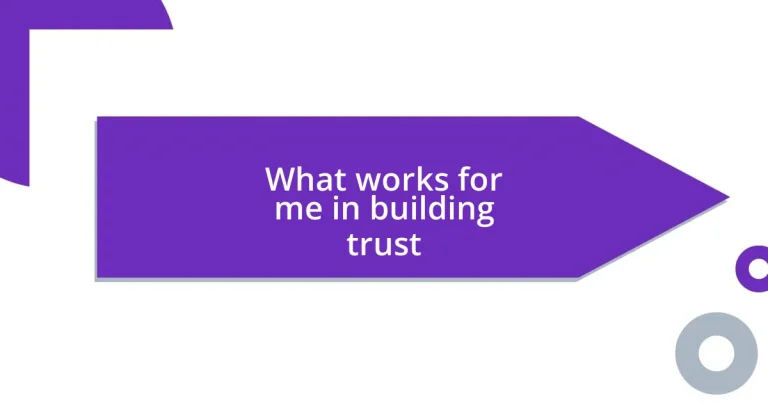Key takeaways:
- Trust is fundamental to relationships, enhancing collaboration and communication.
- Key factors in building trust include consistency, open communication, empathy, accountability, and integrity.
- Active listening and authenticity strengthen connections and foster a supportive environment.
- Trust must be maintained through regular effort, honest conversations, and small gestures of care.
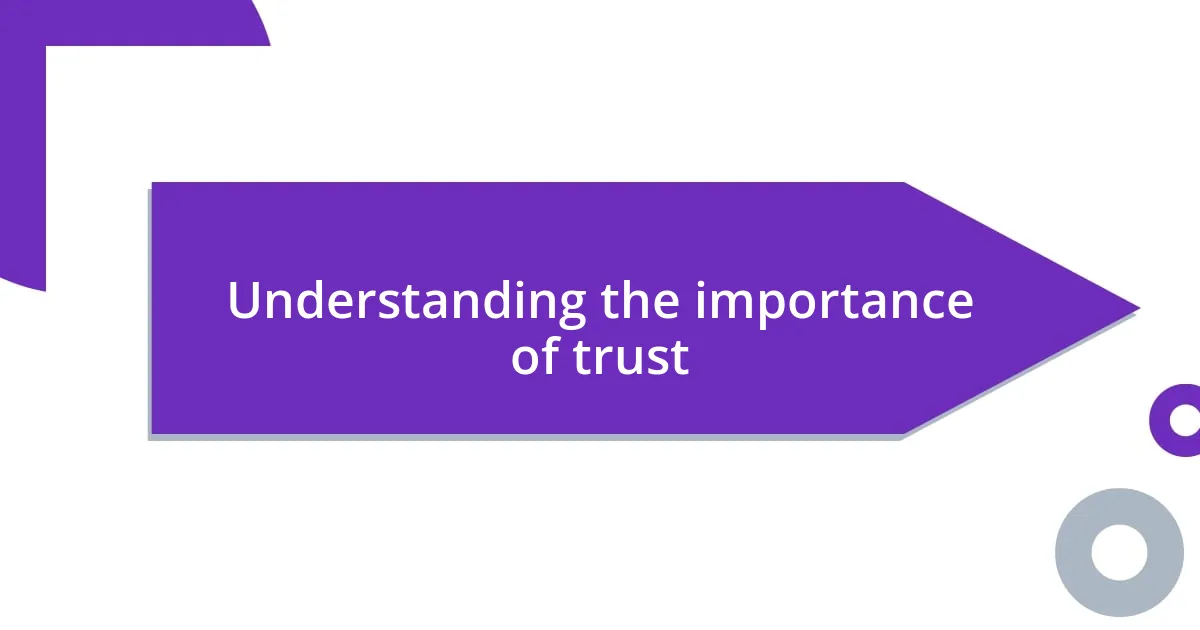
Understanding the importance of trust
Trust is the cornerstone of any relationship, whether personal or professional. I remember the first time a colleague confided in me about a challenging project. At that moment, I realized how crucial it was to create a safe environment where we could openly share our struggles and successes without fear of judgment. Isn’t it fascinating how a simple act of vulnerability can foster a deeper connection?
When I think about trust, I often relate it to the feeling of standing on the edge of a diving board, hesitating before jumping in. That exhilaration and fear perfectly capture the essence of trusting someone or something. Trust allows us to let go of our fears and take that leap. It transforms the dynamics of our interactions, creating a ripple effect that can enhance collaboration and innovation.
Consider how trust impacts our daily lives. Have you ever walked into a restaurant where the staff greeted you like a friend? That feeling of warmth stems from trust; you know they’ll take good care of you, ensuring you have a pleasant experience. In my own life, I’ve seen how much faster teams can achieve their goals when trust underpins their work, enabling honest feedback and open dialogue.
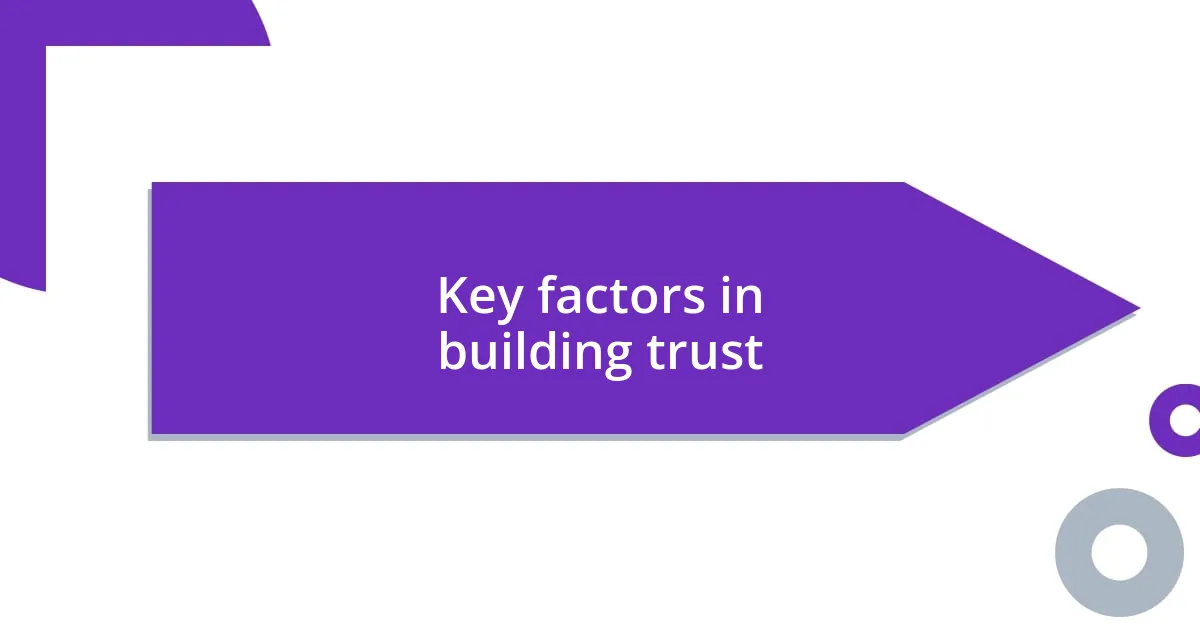
Key factors in building trust
Building trust is multi-faceted, and a few key factors stand out for me. First and foremost is consistency. I recall a time when a manager consistently followed through on promises, which made me feel secure in my work environment. This reliability encouraged me to share my ideas without fear, knowing that my voice would be valued. Furthermore, open communication plays a crucial role; I’ve learned that when I communicate authentically and encourage others to do the same, it cultivates understanding and connection.
Here’s a concise list of key factors in building trust:
– Consistency: Being reliable in actions and words.
– Open Communication: Sharing thoughts candidly, which fosters transparency.
– Empathy: Understanding and validating others’ feelings.
– Accountability: Taking responsibility for one’s actions.
– Integrity: Upholding strong moral principles that align with one’s values.
Each of these elements works together, building a solid foundation of trust that can transform relationships in ways I’ve personally witnessed in both my professional life and friendships. Trust doesn’t just happen; it’s built, brick by brick, through our daily interactions.
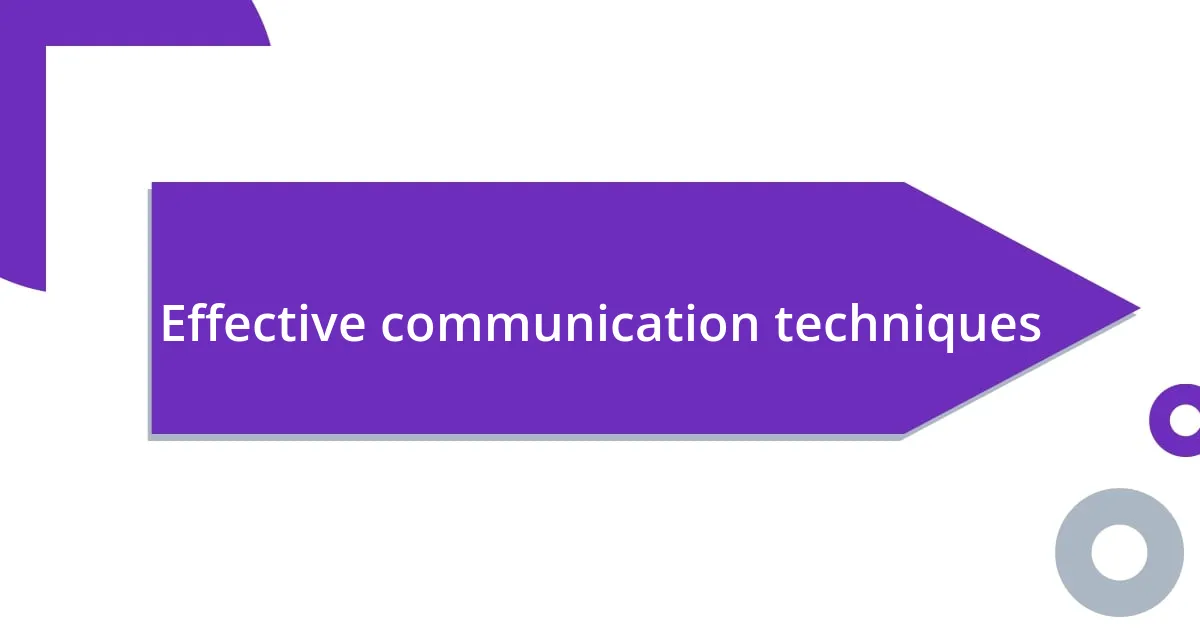
Effective communication techniques
Effective communication is at the heart of trust-building. I remember a situation where I had a misunderstanding with a colleague during a crucial project. Instead of letting it fester, I chose to address it immediately. By openly discussing our perspectives, we both gained clarity and found common ground, reinforcing our trust in each other. Isn’t it interesting how addressing conflicts head-on can actually deepen relationships?
Another technique I value is active listening. I’ve encountered many scenarios where my attention to a friend’s concerns transformed a casual conversation into a meaningful exchange. By nodding, paraphrasing what they said, and asking follow-up questions, I demonstrated that I truly valued their feelings. This practice not only strengthens bonds but also fosters a space where individuals feel heard and understood.
Moreover, providing constructive feedback is crucial. In my experience, I’ve seen how sharing honest insights while being supportive creates an atmosphere of psychological safety. I once had a mentor who balanced honesty with kindness, and that encouraged me to grow without the fear of judgment. Striking the right balance between honesty and empathy has a profound impact on nurturing trust.
| Communication Technique | Details |
|---|---|
| Addressing Conflicts | Confront misunderstandings to clarify perspectives. |
| Active Listening | Engage fully by nodding, paraphrasing, and asking questions. |
| Constructive Feedback | Provide honest insights while remaining supportive and kind. |
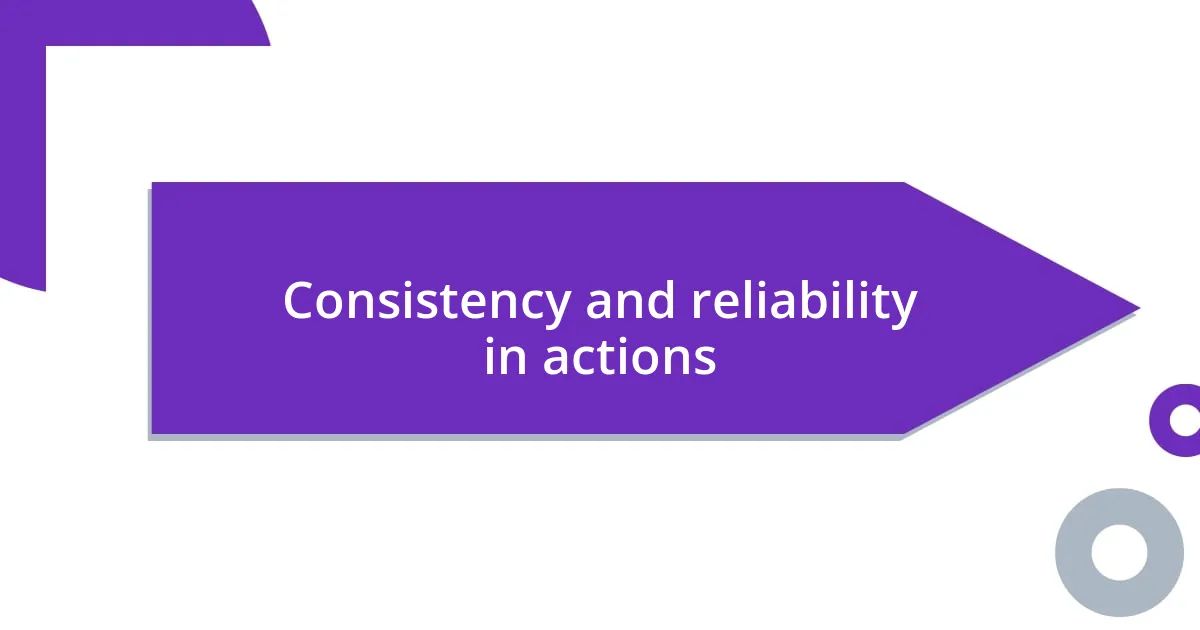
Consistency and reliability in actions
When I think about consistency, I remember a time in my early career when my team faced some significant challenges. One colleague always delivered on his commitments, meeting deadlines without fail. His unwavering reliability not only made my job more manageable but also inspired me to adopt a similar approach. I realized then that knowing someone will always be there, consistently meeting expectations, establishes a level of trust that is hard to break.
Reliability goes beyond just fulfilling obligations; it’s also about being predictable in our behaviors. I once worked with a team member who had a knack for changing plans at the last minute. While I appreciated her enthusiasm, it created an air of uncertainty. It made me question whether I could count on her when it mattered most. Reflecting on that experience, I learned that being consistent in our actions fosters a sense of security, allowing others to trust in our support and presence.
Think about a time you had doubts about someone’s commitment to you. How did their actions affect your perception? Personally, I’ve found that champions of consistency become the bedrocks of trust in our lives. Each time I’ve witnessed someone following through, it reinforced my belief in them. And in turn, I feel compelled to be reliable for others, knowing that trust is a two-way street built by mutual actions.
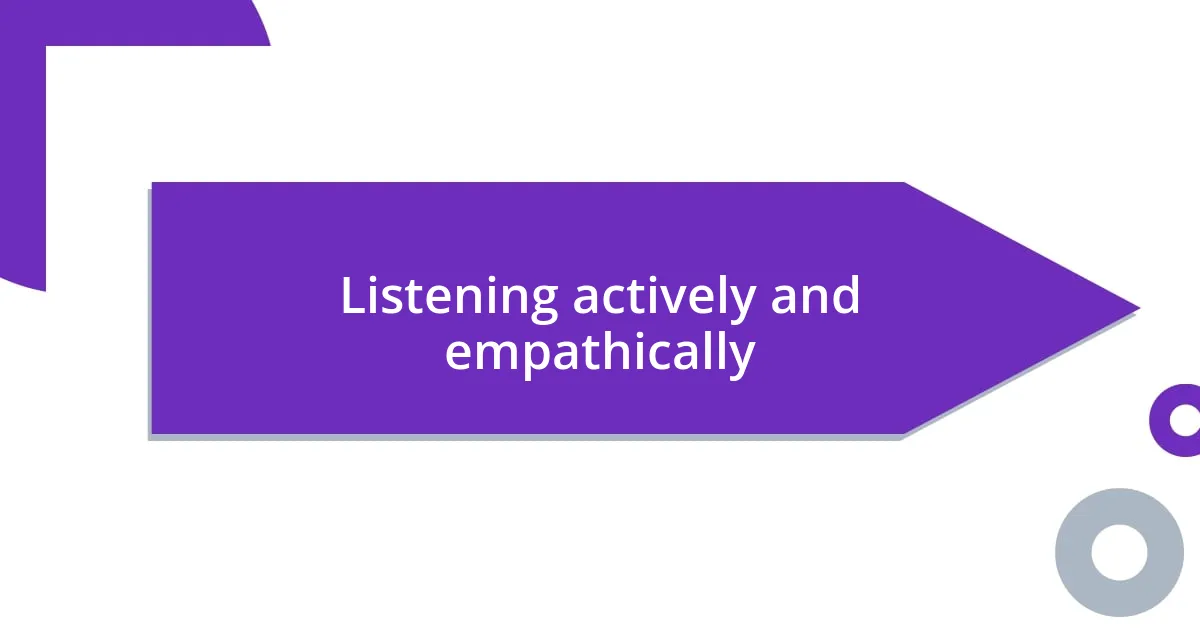
Listening actively and empathically
Active listening requires more than just hearing words; it’s about truly understanding and connecting with the speaker. I recall a moment when a friend shared her struggles with anxiety. Instead of offering quick advice, I focused on what she was saying, making eye contact and nodding along. This simple act conveyed my support and encouraged her to open up further. Have you ever felt how powerful it is when someone is genuinely present in a conversation? It’s as if a weight is lifted, making you feel validated.
Empathy plays a vital role in active listening. I remember a work meeting where a colleague expressed frustration over a project delay. I didn’t just listen to her concerns; I reflected on how it felt when I faced similar situations. By acknowledging her feelings and sharing my own experiences, I could bridge our emotions, creating a shared space of understanding. This not only eased her distress but helped build a deeper connection between us. Have you considered how your own experiences can enhance your connections with others?
Ultimately, the practice of active and empathic listening enriches relationships and fosters trust. I find that people often feel energized and valued after an authentic conversation, which speaks volumes about the trust we build through these interactions. When I leave a discussion where I’ve listened deeply, I feel a sense of fulfillment, knowing that my attention can change someone’s perspective or just brighten their day. Have you experienced that joy of being present for someone else? It’s a reminder that, in our fast-paced world, taking the time to listen can truly make a difference.
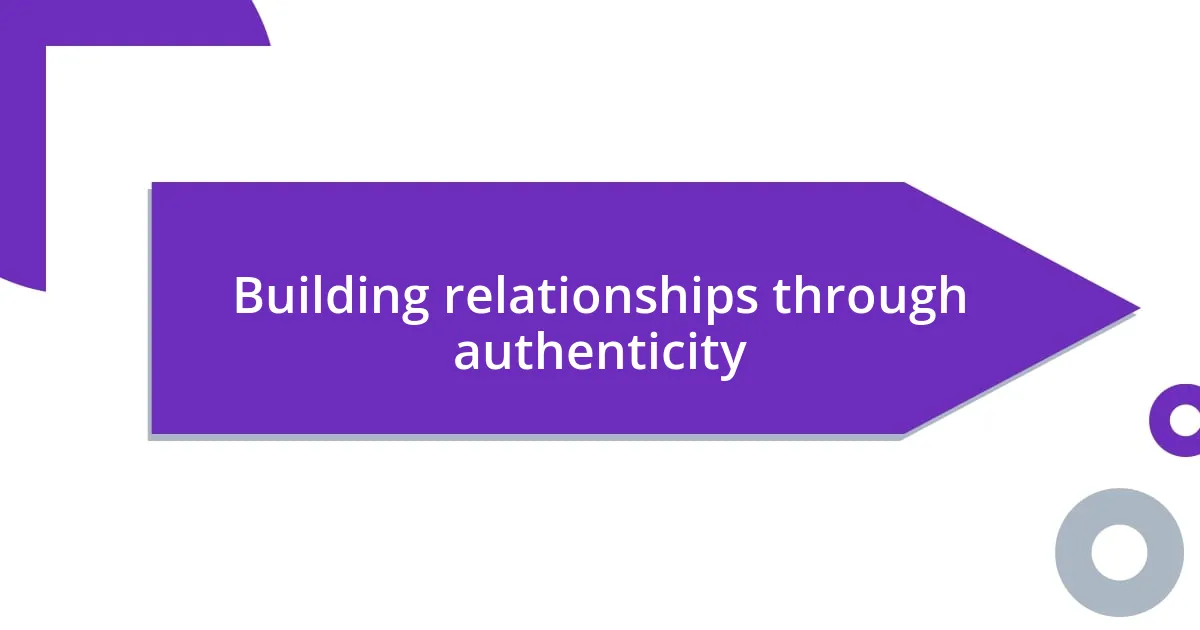
Building relationships through authenticity
When I think about authenticity, I can’t help but recall a networking event where I chose to be myself instead of following the typical “professional” script. I opened up about my struggles in finding the right work-life balance, and surprisingly, people responded positively. It’s as if my honest sharing cut through the formalities, creating instant connections. Have you ever seen how vulnerability can draw people in? I believe that when we show our true selves, we not only invite trust but also pave the way for deeper, more meaningful relationships.
Being authentic means embracing our imperfections. I remember a time when I mistakenly misspoke during a presentation. Instead of covering it up, I admitted my mistake with a laugh. The atmosphere shifted completely; my colleagues relaxed, and many shared their own similar blunders. This light-hearted exchange showed me that admitting flaws can break down barriers. Have you witnessed how realness fosters camaraderie? I truly think that when we acknowledge who we are, flaws and all, we allow others to do the same, nurturing a supportive environment.
Every interaction infused with honesty reinforces the foundation of trust. I once had a mentor who openly discussed her career missteps, revealing how she learned from them. This transparency was not only refreshing but also incredibly inspiring. It convinced me that authenticity cultivates an atmosphere where everyone feels safe to share their experiences. What does authenticity look like for you? I find that embracing our true selves invites others to join in, building a web of trust that strengthens over time.
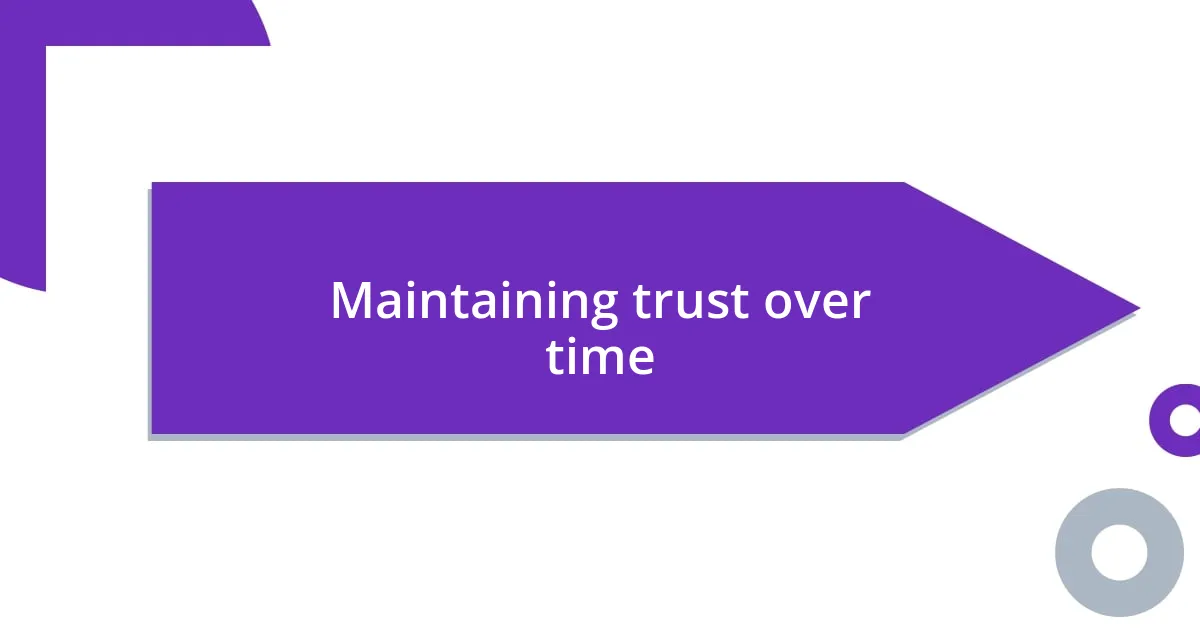
Maintaining trust over time
Maintaining trust over time requires consistent effort and open communication. There was a time when I worked on a long-term project with a team, and our initial enthusiasm waned as challenges arose. By regularly checking in and being transparent about our progress and hurdles, we not only kept our commitment to one another but also strengthened our shared trust. Have you ever felt how crucial consistent updates can be to sustain relationships?
I’ve discovered that trust is akin to a garden; it needs regular care to flourish. I remember a friendship that faced a rough patch due to my busy schedule. By deliberately making time for honest conversations, admitting I was overwhelmed, and asking for their understanding, we revitalized our bond. Isn’t it fascinating how honesty in expressing our limitations can actually deepen relationships rather than weaken them?
Moreover, small gestures can significantly impact trust over time. I make it a point to reach out with a quick message or a call just to check in on those I care about. There was a period when I sent a simple text to a colleague who had been feeling undervalued at work. That brief connection reminded them they weren’t alone and reinforced our mutual respect. Can you recall a moment when a small gesture made a big difference in your relationships? I believe these intentional acts nourish the roots of trust, allowing it to grow deeper and more resilient as time passes.







